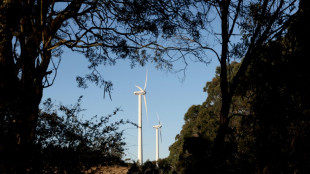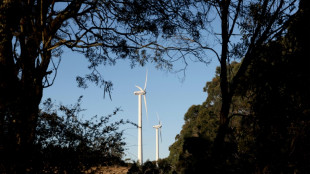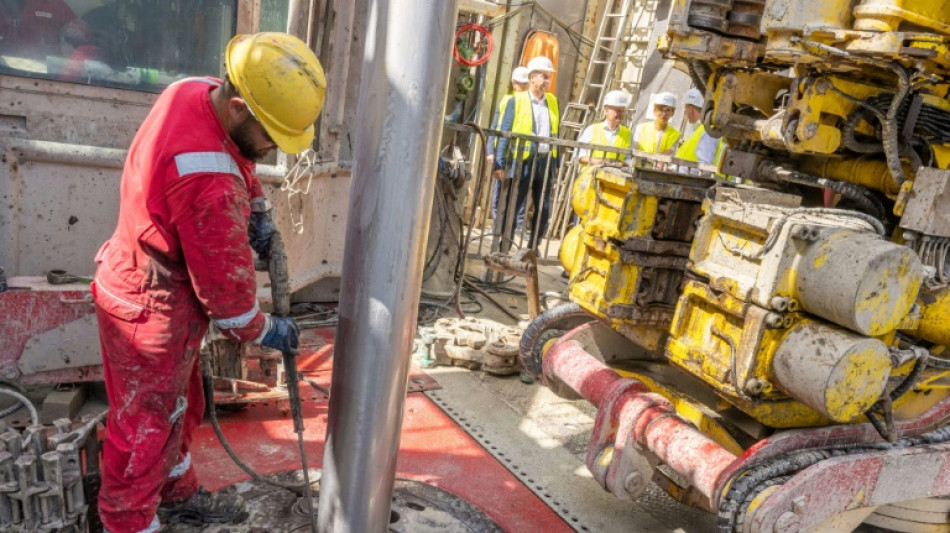
-
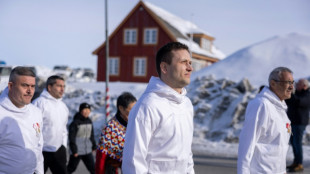 Greenland PM visits Denmark as Trump threats loom
Greenland PM visits Denmark as Trump threats loom
-
Philippines, US test air defences as China seizes reef
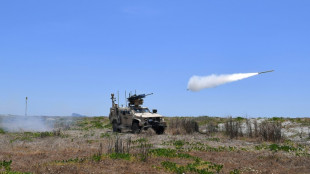
-
 25 killed, fires still burning in huge Iran port blast
25 killed, fires still burning in huge Iran port blast
-
India and Pakistan troops exchange fire in Kashmir

-
 Eighteen killed, fires still burning in huge Iran port blast
Eighteen killed, fires still burning in huge Iran port blast
-
No handshake at muted India-Pakistan border ceremony

-
 Maligned by Trump, White House reporters hold subdued annual gala
Maligned by Trump, White House reporters hold subdued annual gala
-
Austria trials DNA testing to uncover honey fraud
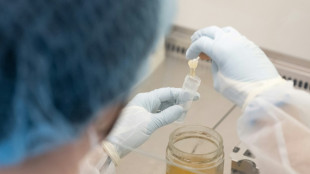
-
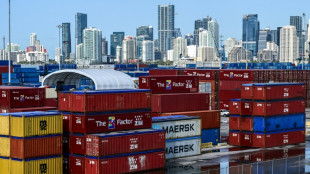 Trump trade war pushes firms to consider stockpiling
Trump trade war pushes firms to consider stockpiling
-
D'Backs' Suarez becomes 19th MLB player to hit four homers in one game

-
 Continuity or rupture: what direction for the next pope?
Continuity or rupture: what direction for the next pope?
-
Surridge scores four as Nashville smash seven past Chicago

-
 Chinese tea hub branches into coffee as tastes change
Chinese tea hub branches into coffee as tastes change
-
Diplomacy likely to trump geography in choice of new pope

-
 All eyes turn to conclave after Pope Francis's funeral
All eyes turn to conclave after Pope Francis's funeral
-
Doves, deaths and rations: Papal elections over time

-
 Progressive Canadians say social issues blown off election agenda
Progressive Canadians say social issues blown off election agenda
-
Liverpool primed for Premier League title party

-
 Buenos Aires bids farewell to Francis with tears, calls to action
Buenos Aires bids farewell to Francis with tears, calls to action
-
Thunder sweep past Grizzlies in NBA playoffs, Cavs on brink

-
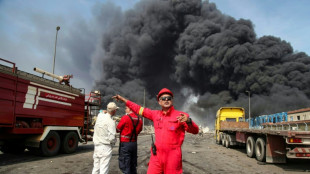 Major blast at Iran port kills 14, injures 750
Major blast at Iran port kills 14, injures 750
-
'What we live for': Kounde after winning Barca Copa del Rey final

-
 More McIlroy magic at PGA pairs event but Novak and Griffin lead
More McIlroy magic at PGA pairs event but Novak and Griffin lead
-
Fire rages after major blast at Iran port kills 14, injures 750
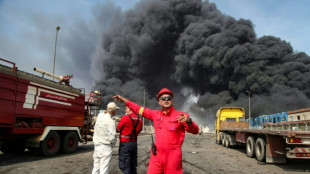
-
 Denkey wonder-strike keeps Cincinnati on track in MLS
Denkey wonder-strike keeps Cincinnati on track in MLS
-
Barca edge Real Madrid in extra-time to win wild Copa del Rey final

-
 'Legendary' Eubank Jr beats Benn in grudge bout
'Legendary' Eubank Jr beats Benn in grudge bout
-
Thunder sweep past Grizzlies into NBA playoffs 2nd round, Cavs on brink

-
 South Korea's Ryu and Japan's Saigo share LPGA Chevron lead
South Korea's Ryu and Japan's Saigo share LPGA Chevron lead
-
Canada leaders make closing pitches in campaign upended by Trump

-
 De Bruyne's Man City exit 'so difficult' for Guardiola
De Bruyne's Man City exit 'so difficult' for Guardiola
-
'No regrets' for Amorim over Man Utd move

-
 Lyon and Strasbourg win to close in on Europe, Montpellier relegated from Ligue 1
Lyon and Strasbourg win to close in on Europe, Montpellier relegated from Ligue 1
-
Toulouse thrash Castres as Top 14 pursuers stumble

-
 Djokovic crashes to nervous Arnaldi in Madrid opener, Swiatek advances
Djokovic crashes to nervous Arnaldi in Madrid opener, Swiatek advances
-
Olympic champs Russell, Davis-Woodhall win at Drake Relays

-
 Browns end Sanders long draft slide
Browns end Sanders long draft slide
-
Cavs crush Heat, on brink of NBA playoff sweep

-
 Fire rages after major blast at Iran port kills 8, injures hundreds
Fire rages after major blast at Iran port kills 8, injures hundreds
-
Kiwi Beamish wins Penn Relays 1,500m crown with late kick

-
 Mbappe on Real Madrid bench for Clasico Copa del Rey final
Mbappe on Real Madrid bench for Clasico Copa del Rey final
-
England survive France fightback to seal Women's 6 Nations slam

-
 Palace sweep past Villa to reach FA Cup final
Palace sweep past Villa to reach FA Cup final
-
CAF appoint Moroccan Lekjaa first vice-president

-
 Major blast at Iran port kills 5, injures hundreds
Major blast at Iran port kills 5, injures hundreds
-
Rodgers vows to stay with Celtic after fourth successive Scottish title

-
 Ipswich relegated as Newcastle, Chelsea boost top five bids
Ipswich relegated as Newcastle, Chelsea boost top five bids
-
Canada leaders make final pitches in campaign upended by Trump

-
 Mullins -- Ireland's national training treasure
Mullins -- Ireland's national training treasure
-
US, Iran say progress in 'positive' nuclear talks


Dig deep: US bets on geothermal to become renewable powerhouse
Though geothermal represents only a tiny fraction of current US energy production, several businesses and President Joe Biden's administration are betting on technological advances to make it a backbone of the green transition.
"If we can capture that heat beneath our feet, it can be the clean, reliable, baseload-scalable power for everybody from industries to households," Energy Secretary Jennifer Granholm told the CERAWeek conference in Houston this past week.
Her department estimates that geothermal energy could overtake hydroelectric and solar power in the country by 2050.
Geothermal, which draws on naturally high temperatures underground and is used mainly to produce electricity and heat buildings, amounted to only 1.6 percent of US energy consumption in 2022.
To ramp up production, the US government has invested more than $200 million since 2018 in an experimental site in Utah involving the drilling of exceptionally deep wells -- an approach different from the traditional, near-surface geothermal energy.
Scientists at the site have been testing, in real-world conditions, a technology known as Enhanced Geothermal Systems (EGS), similar but different from hydraulic fracturing techniques, also known as fracking, which is used to extract oil and natural gas.
The approach involves injecting water into naturally very hot rocks -- often deeper than two miles (3 kilometers), which does not require a nearby hot spring or underground reservoir.
"In theory, you could make geothermal anywhere," said Francesco d'Avack, an analyst with S&P Global Commodity Insights.
"It also reduces the upfront risk," he said -- that is, the risk of drilling and finding nothing, which has been a deterrent for some investors in the past.
Granholm, in her speech to the CERAWeek energy conference, underscored another advantage: the US government is allowing companies to convert permits for oil or gas exploration into geothermal licenses -- reducing paperwork and delays.
In a report this past week, the Energy Department said EGS use fewer chemical additives than classic fracking, a system deplored by environmentalists.
It added that geothermal drilling does not release hydrocarbons, as fracking does.
And unlike solar or wind power, geothermal provides a steady flow of energy regardless of weather or time of day.
- 'A big unlock' -
As for cost, the US government estimates it will drop from a current range of $70 to $100 per megawatt hour (MWh) to $45 by 2035.
The use of existing drilling technology makes geothermal both quicker and cheaper to develop.
"We took the oil and gas operation models, we changed the drill bits a little bit and... we demonstrated a completely new application," said Jigar Shah of the Energy Department's loan office. "That's a big unlock" -- a big leap forward.
"The US has been a first mover" with the new technology, said Ajit Menon, a specialist in subterranean development with Texas-based energy company Baker Hughes, which has invested in geothermal energy.
There are already EGS sites in other countries, notably France, but they're considered experimental.
A possible risk of geothermal drilling projects is that, as with fracking, they can cause seismic activity.
In France's Alsace region, a deep-drilling project was abandoned in 2020 after it provoked several tremors.
The US Energy Department requires all funded projects follow a mitigation protocol to address induced seismicity and is funding research on the issue.
It says no community has felt seismicity occurring near a DOE-funded project.
Several US and Canadian start-ups are vying for position in this budding market and have raised hundreds of millions of dollars from investors.
One of them, Fervo Energy, recently linked its Nevada site to the electric grid. The project was developed in collaboration with Google, which needs huge amounts of electricity for its data centers. So far, though, the site is generating only 3.5 megawatts.
As the geothermal supply begins to grow, demand is following. Google, Microsoft and steel-maker Nucor announced Tuesday that they will jointly be purchasing geothermal energy.
Shah pointed out that the three big firms are "willing to pay a premium" for the energy, and that "gets the private sector excited."
"The new or next generation market is still quite open," said Cindy Taff, CEO of Sage Geosystems, which specializes in subterranean energy. One reason, she said, is that "we need that first commercial facility, and there hasn't been one" yet.
Once one company shows how it can be successfully done, others will follow, she added.
With the sector still so small, "your primary objective is to grow it right," said Menon. "Not only for you -- for everyone."
S.Gregor--AMWN
